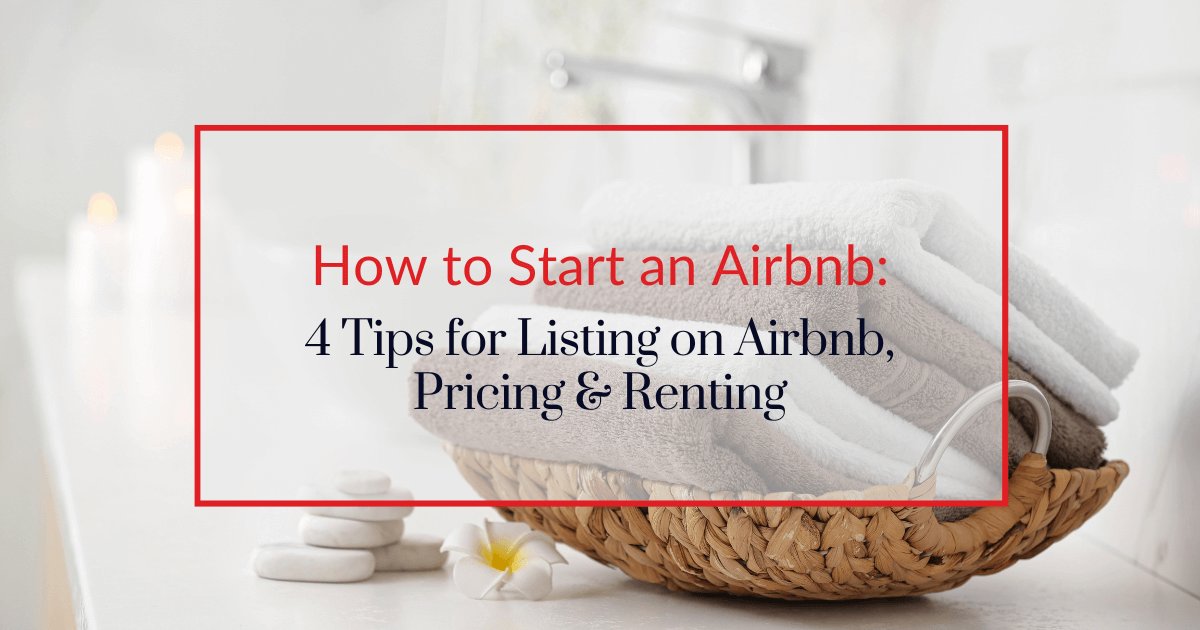How to Start an Airbnb: 4 Tips for Listing on Airbnb, Pricing & Renting
Posted by Gary Ashton on Wednesday, October 26th, 2022 at 2:03pm.

Airbnb properties are becoming more popular with travelers as an alternative to hotels. Property owners can use this top platform to list their homes for free, adding personalized listings, photographs, and previous reviews.
Airbnb is not only favorable to guests, but property owners can adjust pricing at will and enjoy host damage protection offering up to $1 million of insurance for damages to cover their rentals. Here, we'll cover how to get started on Airbnb, including how to find the right property, set pricing, and the best way to set up a home.
Finding the Right Property For an Airbnb
Before investing in a property as a rental or deciding to rent rooms in a personal home or duplex, do some fact-checking to determine if the location is appropriate. Legalities, seasonal factors, and nearby attractions are key considerations.
The first step is determining whether Airbnbs are legal within the property's location. Some cities may prohibit these types of rentals, and condos and townhomes or apartments may have clauses for sublet rentals. Find out if sublets are allowed, and research any permitting and insurance requirements for these types of rentals to avoid facing legal repercussions.
In some situations, big cities may not be the best place for an investment property to advertise as an Airbnb. However, this can depend on how many hotels are near the property and their price levels. The demand for short-term rentals may be lower if the market is competitive.
Small towns can also be challenging locations for Airbnb rentals unless there is a unique draw to the community for tourists. Ideally, investors and owners should find a property near attractions to sustain operational costs and entice visitors, regardless of location.
Consider the Logistics of Airbnb Operations
Those planning on posting a listing for a room or guest house on their own property might be able to easily self-manage the unit. However, those who live far away from the rental will need to consider enlisting the help of a property manager, a cleaning company, and someone local to assist with maintenance.
Find out how much a management agent or company will cost to ensure that overall revenue will not be steeply cut into. The next step is to line up the logistics for the rental to help the hosting process run more smoothly.
Create a set of "house rules" to let guests know what the restrictions are in the space. These rules should include any guidelines concerning smoking, noise, parties, pets, and additional guests.
Next, set up a realistic calendar that allows for reservations only when hosting is possible. The Airbnb system allows for easy updates hosts need, and they can stipulate how much advance notice is necessary for bookings. From there, listing the property is the next step.
Create Your Airbnb Listing

Making the property listing stand out is essential for success in the Airbnb realm. Consider the listing to be an advertisement for the space. With that in mind, owners want to make their listings as compelling as possible.
Begin with the basics, such as location and the type of property. Include details that include:
- Number of bedrooms
- Number of bathrooms
- Pet policies
- Guest policies
- Pictures of the property
- Parking availability
Highlight any unique details about the home in the listing title and description. What makes it special? Is there a pool or stunning views? Are there popular attractions nearby? Maximize potential rental income by showcasing all the Airbnb's best amenities.
Set the Right Airbnb Pricing Strategy
What Airbnb hosts charge is up to them, but choosing a nightly or weekly price requires some consideration. Price is a primary factor that guests consider when deciding where to stay when traveling. Regardless of the space's perks, owners can miss out on bookings if prices are not competitive with local listings.
Before listing, conduct market research by comparing what is being offered in the area of similar spaces. However, Airbnb not only serves as a free listing site—the company also has a Smart Pricing tool that considers over 70 factors for setting daily rates.
Smart Pricing helps owners match their prices with demand. Custom pricing controls consider booking dates like weekends and specific seasons. Owners can change these settings at any time, which is an excellent option when special events in the area occur.
When crafting a listing, remember properties with competitive pricing tend to be reserved early and may be prioritized. Yet, it's essential to keep in mind the nightly price set may not be the final price guests will pay. Some owners need to factor in additional costs for:
- Taxes
- Service fees
- Cleaning costs
- Extra guest charges
- Additional amenity fees
Prepare the Space For Guests
Ensuring the space is ready to go and be rented out is pivotal. The needs of renters may change with the seasons in specific locations. For starters, keeping the place clean and tidy should be a priority. Some owners opt to hire a cleaning company if they don't live on or near the site.
Those planning to rent out a room or part of their private home will want to store valuables in a safe, locked closet, or a storage facility. To make guests feel at home, including small amenities like linens, towels, soap, shampoo, and toilet paper are a good move.
To streamline the experience, hosts should provide accessible check-in details. If someone is onsite to check guests in and out, have set check-in times or make arrangements for someone to be present to welcome them.
Owners or managers can use a lockbox with a key if no one is on the property on check-in dates. Hosts can also provide visitors with check-in instructions on the Airbnb app.
Owners will want to consider adding a few unique details for guests. Some may add flowers to the dining table or leave a bottle of wine, champagne, or an appetizer tray. Some also include a "welcome manual" to make renters feel extra welcome.
Boost Income with an Airbnb Listing
With the right location and a solid understanding of the legalities, an Airbnb property can be profitable. After setting up a listing and the space itself, you will be ready to welcome guests and start earning income that can offset mortgage and operating costs.

Gary Ashton
The Ashton Real Estate Group of RE/MAX Advantage
The #1 RE/MAX team in the World!
